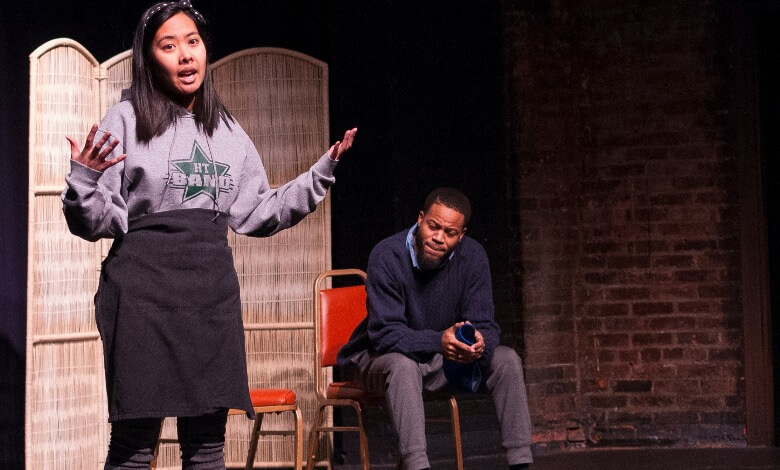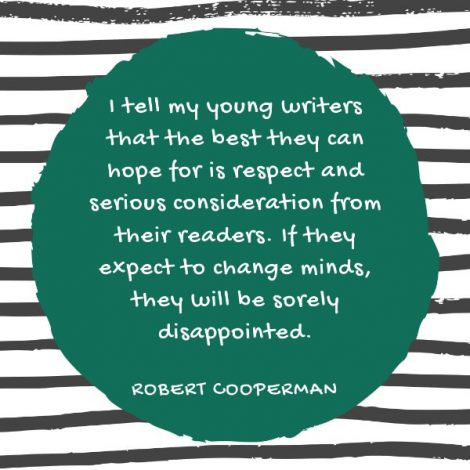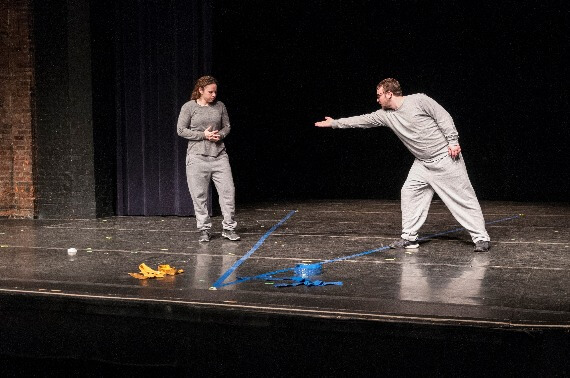How Stage Right Theatrics Brings Badly Needed Balance to the Arts
The Ohio-based company lets 'marginalized' voices be heard

The same progressive groupthink that governs Hollywood exists in other cultural arenas.
Line up for a theatrical show, be it on Broadway or off, and chances are the story’s message will make the NPR crowd cheer. In short, conservative plays and playwrights aren’t given the red carpet treatment.
Robert Cooperman is doing something about that.
Cooperman is the creator of Stage Right Theatrics, an Ohio troupe giving conservative artists a chance to tell their stories, their way. The professor and playwright shared how the company came to be, the cultural forces lined up against it and what people keep getting wrong about his mission.
HiT: Can you briefly share how Stage Right Theatrics started … and how it’s grown over the years?
Cooperman: I have always been in love with theatre but, as I matured I also became more conservative (to my mind, that’s just common sense). I often wondered how I might put those two things together, so in 2016 I started a podcast entitled “Stage Right” (I also love radio and have always wanted to be an on-air talent).
When conducting research for the episodes of the podcast, I came across “The Republican Theatre Festival,” which was presented by a liberal theatre producer in Philadelphia in 2012. I was struck by her bravery: she said she had gotten tired of going to the theatre and seeing only her point of view on stage; she also was banned from a few local theatres after she put on the festival.
I interviewed her on my show, but then I thought, “why not in Columbus, Ohio?” and so, with the (non-financial) support of a couple of influential theatre people in town, I started Stage Right Theatrics with the goal of promoting the conservative voice in the arts.
RELATED: Nick Searcy: Stop Being Afraid of Hollywood Bullies
Our first offering, The Conservative Theatre Festival®, was mounted in January 2017 for one night. It was all I could afford. This year, we presented the fourth annual festival (we perform over the course of a weekend now) and it has become our staple production and the one most identified with Stage Right Theatrics.
This past year, we had the largest audiences we have ever had, for any production we’ve offered.
HiT: Your web site calls conservative artists ‘marginalized.’ What would you say to people who might scoff at that label?
Cooperman: I’d say, “pish-posh!” Seriously, I’d say if you are in the arts, it’s no secret that the people in that industry are predominantly leftist. As a result, they are hostile to the alternative point of view that conservative theatre offers.
There’s a great irony there.
The very same people who are so concerned (or pretend to be) about silencing voices are the ones who have no qualms about keeping the conservative voices silent. They do this by rejecting outright any conservative themes built into plays, but they hide behind “the play is just not well written and wouldn’t work” mantra, which excuses them for saying plainly that the play doesn’t work because its ideology is different from theirs.
I hear from many playwrights (and others in the arts) who are so very thankful that my company exists because at least with me they get a fair shot at production. Granted, some of the plays are pretty bad as plays, but have you ever seen some of the plays produced that are left-wing in ideology? Jeez!
This is why I’m working on a book called “Bad Playwriting,” which is not a “how to write a play book,” but rather a “how to spot bad playwriting”–and it’s very prevalent on the left.
“Disagreement does not equal hate”.
-Robert Cooperman motto
(President of Stage Right Theatrics)
It’s refreshing to see a conservative playwrite company that provides a platform for conservative ideas in the performing arts. pic.twitter.com/O6wuieAcmZ— OnTheEdgeOfTheMatrix (@AngelOnTheEdge2) January 26, 2020
I digress. The fact is, conservative writers look at issues in society and our culture and have a “take” on them. Why, I often wonder, is that “take” not as legitimate as the “take” by those on the left?
My guess it’s because–again ironically–the left wants to protect what it’s built over the past few decades. It is the left that seeks to protect the status quo in the arts, but of course, they don’t see it that way. They see the country as being in a constant state of horror and they must rescue us all through re-education and totalitarianism.
In the example of race, I have always felt that it’s the left that wants the country to remain in 1960 so they always have a battle to wage, even though that battle largely was won years ago.
HiT: Do you have a past production which perfectly captures your group’s mission, and how?
Cooperman: There have been a few. A couple of years ago we presented a neat little play entitled “The Comfort Room” by Cece Dwyer It was about post-birth abortions, which were a horrifying realty even before the Governor of Virginia (the racist) described his “compassionate” process for letting a newborn perish if the mother feels that’s the way it should be.
The play did not poke fun at the opposing point-of-view–it simply presented its point-of-view to be shared in the marketplace of ideas. That’s what we strive to do: get our point-of-view into the marketplace of ideas and let the people (that is, our audiences) decide.
We do not expect people to come out of the theatre saying, “Wow! I’ve changed my mind.” Rather, we want our patrons to say, “Wow! I understand where they’re coming from–and it’s not simply a case of ‘hate.'”
We are seeking a place at the theatrical table; if we change minds, well, that’s icing on the cake. Another production we did (not part of our Conservative Theatre Festival®) was David Mamet’s “The Anarchist,” which was written after Mamet’s much publicized (and criticized) conversion to conservatism.
His play was not a lampoon of the leftist point-of-view (to be sure, we’ve produced plays like that, but mostly in our first year), but a straightforward presentation of his conservative “take” on the issue of redemption. I’m very proud of producing this play because it made you think (one audience member said her brain hurt after seeing it!), it was not simply a parody of those opposed to us, and it was the Ohio premiere of the play.
HiT: What reaction have you received from mainstream theater groups/actors/media over the years?
Cooperman: When we first started we were subject to unrelenting attacks (particularly on social media) for our existence. Local performers refused to work with us, in part because they assumed we were a bunch of died-in-the-wool racists, homophobes, and misogynists–in short, their superficial and pre-determined ideas about what a conservative is and believes.
It’s for this reason that I came up with our motto: “Disagreement Does Not Equal Hate.”® This motto, by the way, has also been ridiculed. The media, at first, were interested in what we were doing (well, the local paper of record–The Columbus Dispatch–anyway), but have been less so as we have grown.
The underground papers still want nothing to do with us and the Dispatch, which has grown much more left wing over the past few years, routinely does not feature our productions except in limited, informational blurbs (date, time, cost, venue,etc.) right before our production premieres.
To be fair, they did publish an op-ed I wriote about conservative theatre last year (but I was forbidden to mention my upcoming production in the essay). Local television has not given us much time (I’ve had some radio exposure a couple of years ago), and I keep trying to interest local reporters.
I can’t really get my arms around why the media is not interested in a unique theatre company right in their own backyard. We are, to my knowledge, the only conservative theatre company in the country; why would that not be celebrated? (That’s a rhetorical question; I suspect I know the answer).
A statewide arts council refused to give me any grant money last year because it said my basic premise–that the arts are predominantly left wing–was not accurate! Over the past year or so, however, we seem to have become more accepted as a force in Columbus theatre.
More and more actors will work with us–particularly as they become aware of how positive it is to work for Stage Right Theatrics (or maybe it’s because we pay well).
RELATED: Shock: Theater Community Silent on ‘FBI Lovebirds’ Cancellation
We don’t sit around discussing politics; we rehearse plays! And we make it a point to welcome anyone to work with us. Our brochure clearly states that we don’t care who you are, where you come from, or who you sleep with. We seek fellow lovers of theatre only.
Still, we are not the most beloved company in Columbus and plenty of local artists will not be associated with us. Their loss.
One more thing: what has certainly helped us gain some acceptance is our participation in the Central Ohio Theatre Roundtable, a consortium of about 30 local theatre companies that serves to promote theatre in central Ohio.
I am now on the Executive Board (I am the Secretary) and have made good connections with some of the “movers and shakers” of our local theatre scene. I have helped launch a program where we promote each other’s shows in our playbills.
In my latest playbill, I had promotions for the local LGBTQIA company as well as the Columbus Black Theatre Festival. I don’t have to agree with their stance in order to promote theatre in Columbus.
HiT: How challenging is it to gain funding? Has that gotten tougher in recent years given our divided times?
Cooperman: Ironically, it was tougher when I started a few years ago. I was an unknown entity then, so funding came from our limited ticket sales and my own pocket. That has changed somewhat of late in that I now have two generous donors (one from Maryland and the other from Florida) who have helped tremendously.
Let’s not kid ourselves: I still just keep my financial head above water with each production, but the fact is, I’m not underwater! What has also helped a lot is that I have been able to secure grant money from The Greater Columbus Arts Council. This is in contrast the that other arts council, referenced above, who said my basic premise was wrong.
Is am still seeking funding, of course, but given the aforementioned sources–and increased ticket sales–we’re doing a lot better financially.
HiT: Let’s talk about your organization’s annual festival … what’s been its most important impact?
Cooperman: I am most proud of the Conservative Theatre Festival®, which just celebrated its fourth year. As I noted above, the Festival is what we are truly known for at this point. I think its impact has been diverse: first of all, through its title, we announce who we are.
Some have said we should dispense with the term “conservative” because it’s too heavy-handed. I disagree. I feel we are putting ourselves out there without resorting to euphemisms or hiding our true intent.
There’s a Black Theatre Festival and a South Asian Theatre Festival in Columbus–why are those not “heavy-handed?”
The rest of our productions in a season do not necessarily scream “conservative” in their titles, but are definitely conservative in outlook. So, I feel the Festival lays the foundation for the purpose and direction of Stage Right’s offerings.
Second, the Festival presents a challenge to the local theatre community–and how the community rises or falls to the challenge says a lot about who we truly are. Performers who work with us despite their political leanings–and despite the obviousness of our Festival title–definitely rise to the challenge.
But no one can say, I didn’t know what they (Stage Right) were!
Third, the Festival has given hope to many conservative playwrights around the country (many of whom remain closeted in their hometown theatre communities). As word has spread about the Festival, more and more playwrights have discovered that we are a company that will take them seriously and give them a fair shake.
Fourth, the Festival gets us noticed–certainly more so than by producing plays such as Jonathan Reynolds’ “Stonewall Jackson’s House,” which we did last year. Again, I think its blatant title makes the difference between getting someone to pay attention and it being considered just another offering in an already crowded local theatre scene.
HiT: Do you have any stories to share about ‘converts,’ people who initially disagreed with your concept but saw a production or two and had a change of heart?
Cooperman: This is where I think we get in trouble by striving to change hearts and minds. I can’t base my company’s existence on this hope. What I can base it on is the hope that people will take us seriously and discover some respect for what we are doing.
If we change a few minds, great, but I don’t go in thinking this will (or has to) happen. I have had audience members tell me they appreciated that we are not so “in your face” and not motivated by hate. This to me is the greatest outcome our productions can have–and the only realistic one.
I use this paradigm when I teach composition at the college level. I tell my young writers that the best they can hope for is respect and serious consideration from their readers. If they expect to change minds, they will be sorely disappointed.
So, we strive for respect, understanding, and to break the stereotype that all conservatives are hateful xenophobes, clinging to our guns and bibles (as a former president suggested), with our Ku Klux Klan robes neatly folded in our clothes draws.
HiT: The best art suggests themes and discussions without hitting us over the head with them… can you share how your artists avoid the latter? Is that one of your biggest challenges as a storyteller/director?
Cooperman: Sometimes our artists can’t and this is a constant struggle when choosing plays to produce because I often have to sacrifice artistry for message. I think it boils down to the skill of the playwright. I can tell them all day that they can’t hit us over the head, but many may be incapable of doing so.
So, yes, it is one of my biggest challenges–and that goes for me as a playwright, too. Even I have evolved as a storyteller. In my first Conservative Theatre Festival®, I put on one of my plays which parodied the concept that sexuality is fluid. I was criticized for being so blatant and it’s a criticism I can live with (even though the piece was parody and, hey, conservatives have been bashed and parodied for years).
I have since tried to be a little more sophisticated in my approach and not worry so much about presenting the other side as fools. I can’t make my case simply by disparaging the left–we have to be so much more than that.
RELATED: Broadway Star Lupone Gets Ugly on Twitter, Then It Gets Worse
Of course, it also helps to be realistic and say that very, very few of the plays we produce are going to be “art.” I have a particularly narrow view of what constitutes art. We live in an age where vomiting on the sidewalk can be considered art and where everyone who produces anything is an “artist.” I say, if everything is art, then nothing is.
Most of the plays we produce are certainly good with their heart and mind in the right place (pun intended), but are they art? Maybe I’m confusing “art” with “literature”? I can say for sure that the majority of plays I produce are not literature.
HiT: Your group is Ohio-based … do your plays travel to other states/areas? How might we find them?
Cooperman: Right now we have remained in Ohio, but I would love to bring the Conservative Theatre Festival® to other states. I wish I knew how to do that, though. I have had some interest from others who want to produce conservative plays in their states (Florida, primarily), but so far nothing has come of it.
Photo credit: Steve Sessions.



